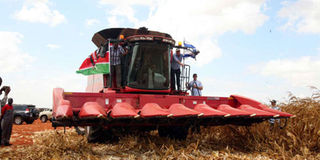Private investors to run Galana Kulalu Irrigation project

Water minister Eugene Wamalwa and Israel Agriculture and Rural Development Minister Uri Yehuda Ariel Hacohen ride on a harvesting machine at Galana Kulalu in Tana River County on September 9, 2015. PHOTO | FILE | NATION MEDIA GROUP
What you need to know:
The government is preparing to hand over 20,000 acres of the expansive food security project to private firms and the Agricultural Development Corporation.
It is expected this will result in availability of 2 kilogramme packet of maize flour to be sold to Kenyans at Sh75 each.
The Galana Kulalu project is a key feature of the Jubilee government’s manifesto on ensuring food security, one of the four pillars of President Uhuru Kenyatta’s agenda.
Kenyans will wait longer for cheap maize flour from the Galana Kulalu Irrigation project, even as the government plans to cede its operations to private investors to boost production.
The government is preparing to hand over 20,000 acres of the expansive food security project to private firms and the Agricultural Development Corporation (ADC) to plant and mill more maize by March, according to Water Cabinet Secretary Eugene Wamalwa.
It is expected this will result in availability of 2 kilogramme packet of maize flour to be sold to Kenyans at Sh75 each. Currently the commodity sells at between Sh115 and Sh120
To date, only 5,000 acres, out of the targeted one million, have been put under crop as work is fast-tracked for completion of the remaining 4,400 acres after installation of five pumps.
The completion date of the remaining part of the irrigation infrastructure has also been revised to March from last September. The CS said construction on an additional 10,000 acres will start in August.
National Irrigation Board (NIB), which is implementing the project, is expected to hand it over to ADC which will be fully in charge of commercial operations in the next two months.
MAIZE MEAL
Kenyans were hopeful that the Galana maize meal would soon be on their tables after the State-sponsored unga subsidy programme ended this month. But CS Wamalwa was non-committal on when Galana maize flour would be on the shop shelves.
“We have the sample that shows a 2kg packet of Galana unga can be produced at Sh75 and that is part of the project’s proof of concept but it’s not for production. We are inviting the private sector to do the production and commercialisation phase for us starting March,” Mr Wamalwa said.
The minister spoke during an inspection tour of the project site on the border of Tana-River and Kilifi counties on Wednesday. He was accompanied by his Agriculture counterpart Willy Bett.
The Galana Kulalu project is a key feature of the Jubilee government’s manifesto on ensuring food security, one of the four pillars of President Uhuru Kenyatta’s agenda.
The move by the government comes against a backdrop of a dismal harvest from the 10,000-acre demo farms and whose outcome was to be replicated in the targeted one million acres.
CLIMATE CHANGE
The recent status report shows the scheme produced twenty, 90kg bags of maize per acre from March 2017 to date, down from 31 bags per acre in April-October 2016, prompting MPs to question the viability of the Jubilee flagship project in Parliament.
The key mandate of the Galana irrigation project was to move the country from rain-fed agriculture in the wake of climate changes. At inception, it was reported that one acre would produce 40 bags of maize, higher than the national average of 17 bags that farmers in the country’s grain basket of Rift Valley harvest currently.
But NIB blamed a mix of factors for the poor maize harvest of the breeds planted in the pilot project carried out by Israeli firm Green Arava.
“We had an army worm attack but we took swift action otherwise we would have lost everything. There were also abnormally high temperatures which affected pollination and fertilisation. That combination saw a decline in the yield,” General Manager Mugambi Gitonga said.




